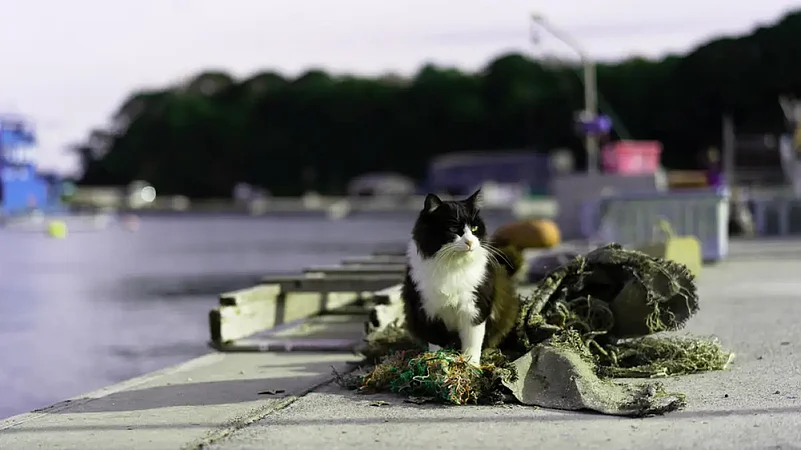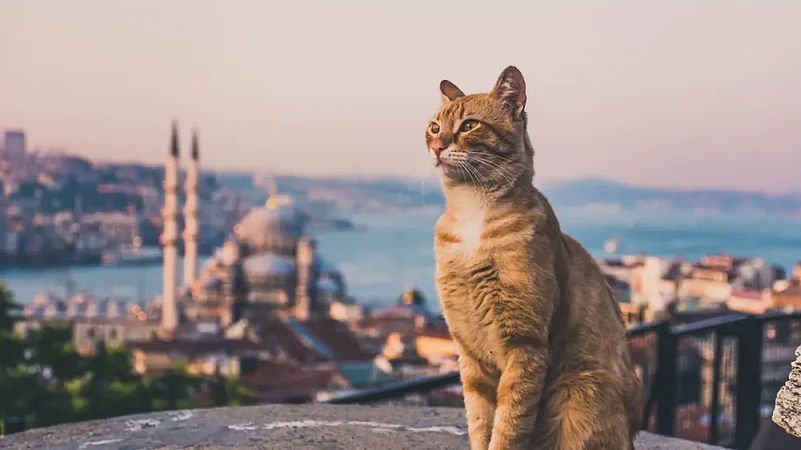San Juan’s Cobblestone Street Cats
Cats were brought to San Juan, Puerto Rico, by the early Spanish settlers, in order to control the rat population in the city. Not all cats that roam the streets of San Juan are ferals. There is a visible mix of those scurrying strays, ferocious ferals and cats with collars exiting and entering buildings, as it pleases them. Mostly seen in and around the streets of Fortaleza, the cats of old San Juan are also known as the ‘cobblestone cats’. Apart from the local residents taking care of these furry ferals, there are programmes and initiatives like ‘Save a Gato Cat Sanctuary’ that offer cats for adoption and have volunteers helping them.
After Hurricane Maria, several cats were abandoned by their owners. These strays found shelter at the base of Castillo San Felipe Del and are fed by the volunteers of ‘Save A Gato’. The ferals spotted on the blue cobblestoned streets of 500-year-old San Juan add a certain charm to the Puerto Rican old town experience.
Cat Island’s Capital Valetta
If you are visiting Valetta, the capital of Malta, be assured that you will find the island’s cultural landscape dotted with cats. Valetta’s Upper Barrakka Gardens are also known as cat gardens, owing to the kitties strolling around. Be it homes, parks, turn and corner of the streets, felines are integral to Malta. While some locals shoo them away, most feed the cats and provide them temporary shelters. The Maltese ferals enjoy the warmth of the sun during the day and sleep with full bellies. Malta, also known as the ‘Island of Cats’, has cat caretakers from all age groups.
Apart from the entire community, there are several organisations in Malta which look after the felines. Maltese people seem to have a soft spot for cats as even private veterinarians at local clinics contribute to their health care.
Check out the documentary Cats of Malta which celebrates the island's stray cats and the locals — who through volunteering, art and folklore—show the cats unconditional love and support.
Toronto’s Cat Colonies
There are over thirteen colonies in the Alderwood area of Toronto providing cats with shelter, food, water and veterinary care. Since feral cats are busy exploring the nooks of the street and nearby wilderness, they can carry worms and parasite. Often they need dental work too, which comes at quite a cost. The colonies have six shelters each. As per the trap-neuter-release initiative of the THS (Toronto Humane Society), several feral cats have been neutered and returned to the streets.
The principle behind the spay-trap-release programme is that ‘fewer are better in the wild’, since uncared-for ferals have to suffer harsh climatic conditions, hunger, sickness, lack of shelter and much more. While ferals were being fed by local residents, with the pandemic, it has become extremely difficult for people to offer the same supplies.
Istanbul’s Feline Obsession
Istanbul is a beautiful cat factory with its residents showing a certain special warmth and affection for them. Many believe that without the street cats, Istanbul would lose its soul.
The cats of Istanbul are quite well-known. The marvellous documentary Kedi is dedicated to the cats. Volunteers and local residents take care of the ferals and street cats In Istanbul. The cats you might find here are a mix of feral and stray, and they are not scared of human touch.
Roman Cat Sanctuary
Italy’s capital city enjoys the status of being a culturally and historically rich destination with ancient ruins scattered all over its landscape. For those who love animals, Rome is also abundant in street cats. In fact, they are actually placed under the category of ‘bio-heritage’ by the city council. Torre Argentina, a Roman plaza, a site related to the stabbing of Julius Caesar in 44 BCE, has a litter of ferals that live in the Torre Cat Sanctuary. Started in 1993 as a cat shelter, the sanctuary takes care of feeding, spaying and neutering cats, offers adoption services, and maintains a log of abandoned cats.
Rome also has a group of cat ladies who go by the name ‘le Gattare’. This group organises adoption events for not just cats, but other stray animals as well. Much like the Egyptians, the ancient Romans worshipped cats on special occasions.
You will find the cats striking photogenic poses, sprawling on the streets freely, and soaking in the warmth of the sun. But feral and stray cats here don’t have an idyllic life. Harsh weather conditions, temperature changes, days without food and water, and the absence of human love are also a part and parcel of their daily lives.
Japan's Cat Islands
The people in Japan take cats quite seriously, featuring them in anime regularly and cat merchandise are a big part of kawaii culture. There are islands dedicated to cats as well. Tashirojima off the coast of Ishinomaki city in Miyagi Prefecture is known as Cat Island. The residents here worship the several hundred felines on the island. And get this - dogs have been barred from the island. There are shrines dedicated to cats here. Another island Ainoshima (near Shingu port in Fukuoka) has many cats hanging out by the port.

Houting Cat Village, Taiwan
Houtong was the place for Taiwan's largest coal mine once. The town's human population went down in the 1990s when the mine closed, and the feline residents started coming in. Later, the authorities opened the Houtong Coal Mine Ecological Park to attract visitors. But more than the park, people come to take selfies with the cats who laze around what is called the Cat Village.
Do-It-Yourself Cat Houses of Burlington
You will encounter cats with clipped ears in Burlington, South Jersey. The clipped ear is a sign that the cat has been neutered and vaccinated, under the trap-neuter-release programme. The clipping is also a symbol of the cat being feral. The difference between feral and stray cats in South Jersey is also indicated by microchips, an under-the-skin implant which has the registration number of the pet, and can help return a lost pet to its owner.
Feral colonies here have do-it-yourself cat houses which are insulated and equipped with food and water. The DIY kitty homes are set up at a slight distance from residential areas.

























